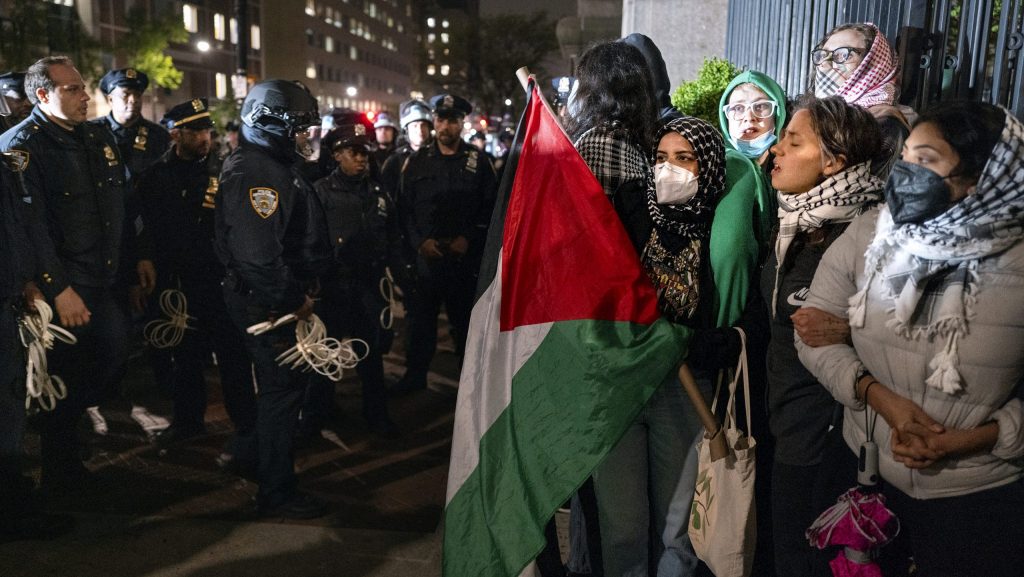Created Equal: What Columbia University’s crackdown on protesters tell us about free speech on college campuses
Created Equal May 1, 2024Shikha Dalmia and Dr. Sophia Rosenfeld join Stephen Henderson to discuss free speech and authoritarianism amid escalating responses to pro-Palestine demonstrations on college campuses.

Demonstrators hold their ground near a main gate at Columbia University in New York, Tuesday, April 30, 2024, as New York City police officers move to clear the area after a campus building was taken over by protesters earlier in the day.
Hundreds of protesters have been arrested on college campuses across the country in recent weeks.
The escalating tensions between student-led protesters and university officials at Columbia University on Tuesday led to New York Police Department officers clad in riot-gear forcibly removing protesters from the Hamilton Hall building which they had occupied for less than 24 hours.
Hamilton Hall has been the site of several student-led occupations in the past, including a week-long protest of the Vietnam War in 1968 and a three-week blockade in 1985 demanding the university divest from South Africa over their apartheid system.
Columbia University President Nemak Shafik has since requested that NYPD maintain a presence on campus through May 17, two days after commencement ceremonies conclude on the Ivy League school’s campus.
Demonstrators were also arrested in Harlem on the grounds of City University of New York. At UCLA, violence broke out when a vigilante mob of counter-protesters attacked the pro-Palestinian encampment.
Shikha Dalmia, president of the Institute for the Study of Modern Authoritarianism, and Dr. Sophia Rosenfeld, award-winning author and chair of the Department of History at the University of Pennsylvania, joined Created Equal on Wednesday to discuss the recent protests and universities’ responses.
Subscribe to Created Equal on Apple Podcasts, Spotify, Google Podcasts, NPR.org or wherever you get your podcasts.
Guests:
Shikha Dalmia is the president of the Institute for the Study of Modern Authoritarianism. She is also the editor-in-chief of The UnPopulist, a free substack publication devoted to defending liberal democracies from the rising forces of populist nationalism. She says free speech policies at American universities are not really about maintaining an environment for open dialogue.
Rather, Dalmia said, “it is more that our congressional leaders have decided they do not like the leftist views on Gaza and they’ve weaponized the narrative of antisemitism against it.”
Dr. Sophia Rosenfeld is an award-winning author and the chair of the Department of History at the University of Pennsylvania, where she teaches European and American intellectual and cultural history. She says the escalating tensions, violence and arrests build on a decades-long history of student-led protests and demonstrations on college campuses in the United States.
“Students get a bad rap in the press — they’re either snowflakes or yelling slogan they don’t understand,” said Rosenfeld. “But students are trying to feel their way through the issues in a very nuanced way.”
Listen to Created Equal with host Stephen Henderson weekdays from 9-10 a.m. ET on 101.9 WDET and streaming on-demand.
Read more:
- Student protestors kicked out of Wayne State Board of Governors meeting after disruption
- Created Equal: Assessing the impact of the ‘uncommitted’ vote in Michigan
- The Metro: The war in Gaza’s impact on the American Jewish community
Trusted, accurate, up-to-date.
WDET strives to make our journalism accessible to everyone. As a public media institution, we maintain our journalistic integrity through independent support from readers like you. If you value WDET as your source of news, music and conversation, please make a gift today.
